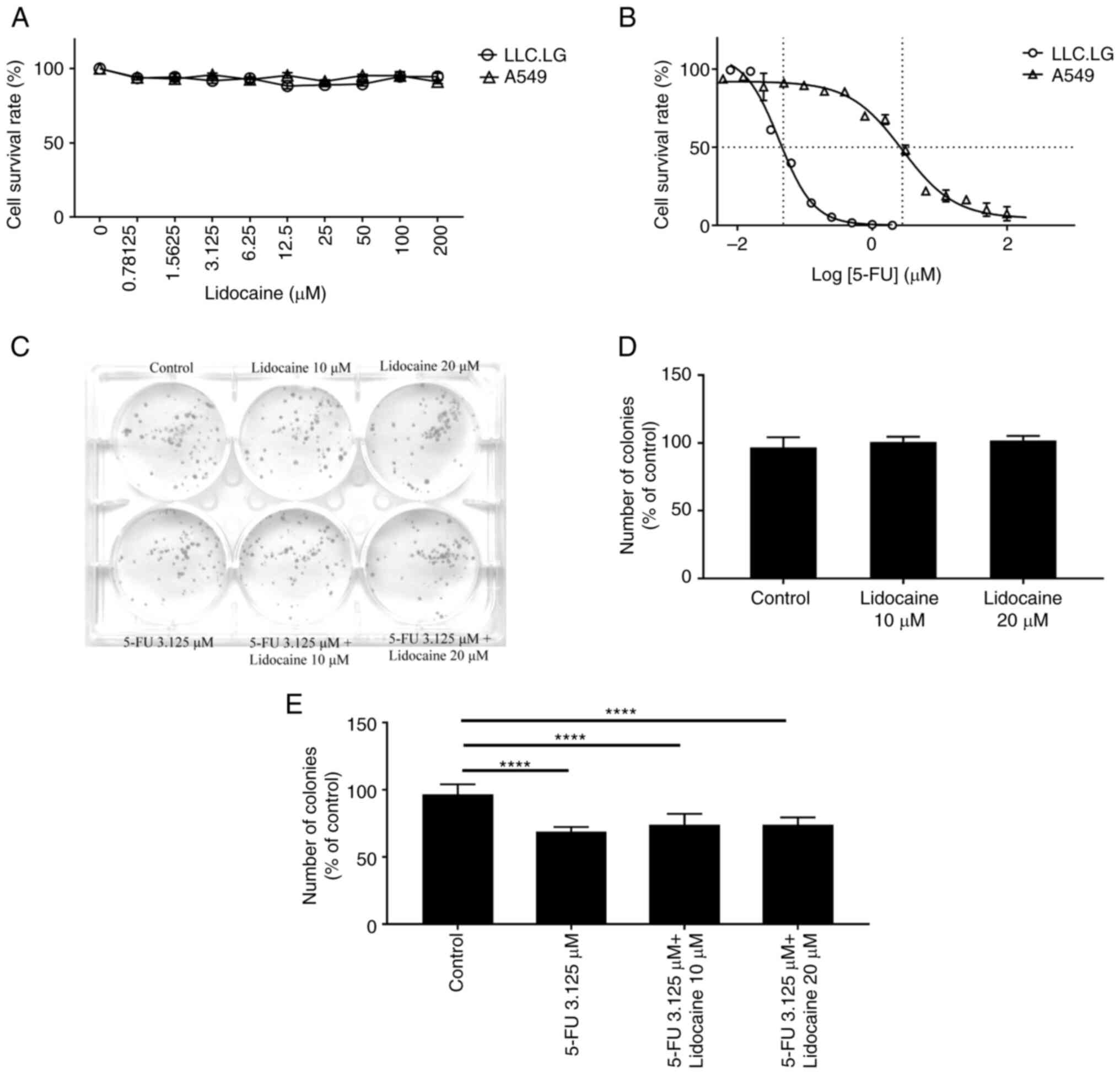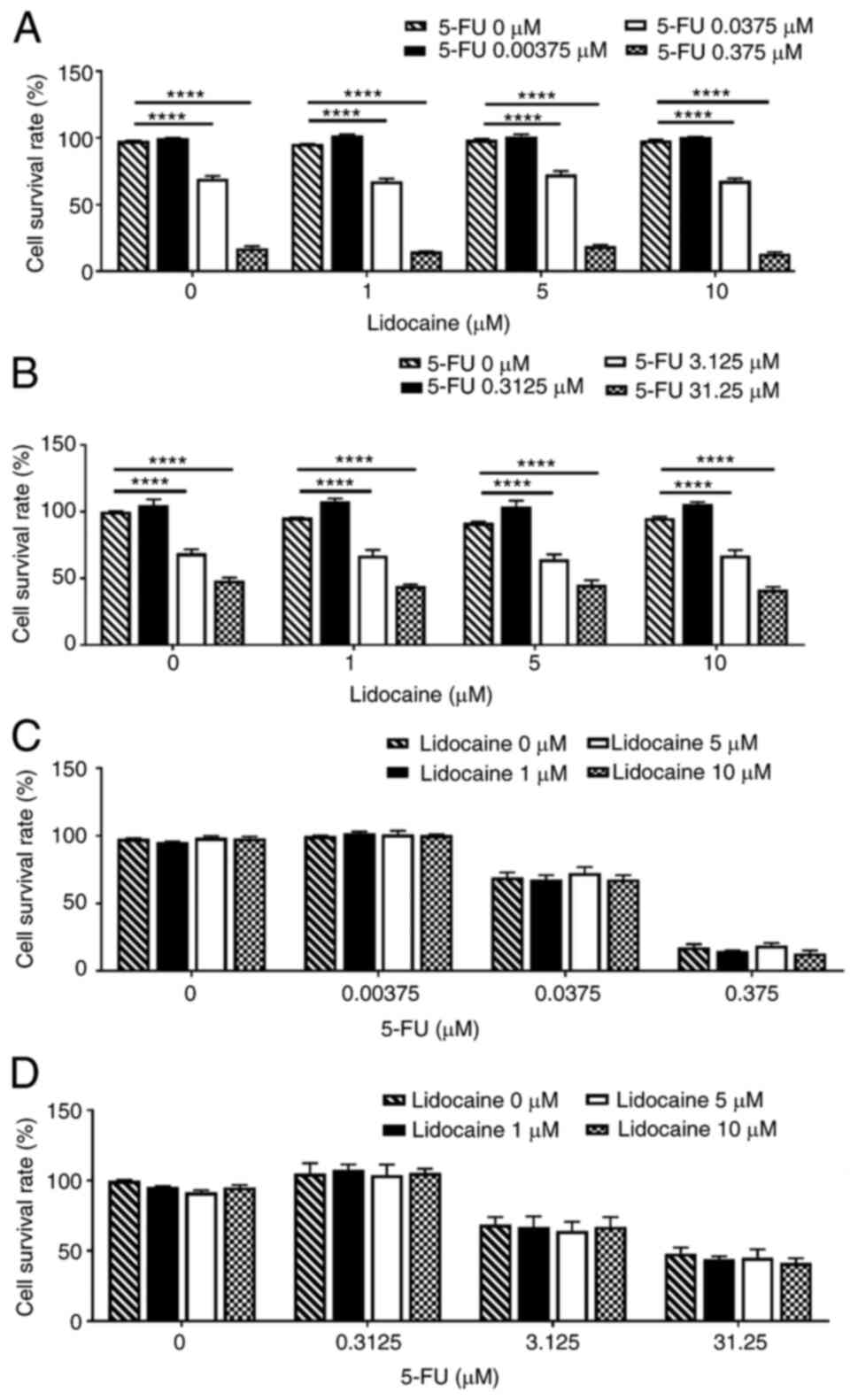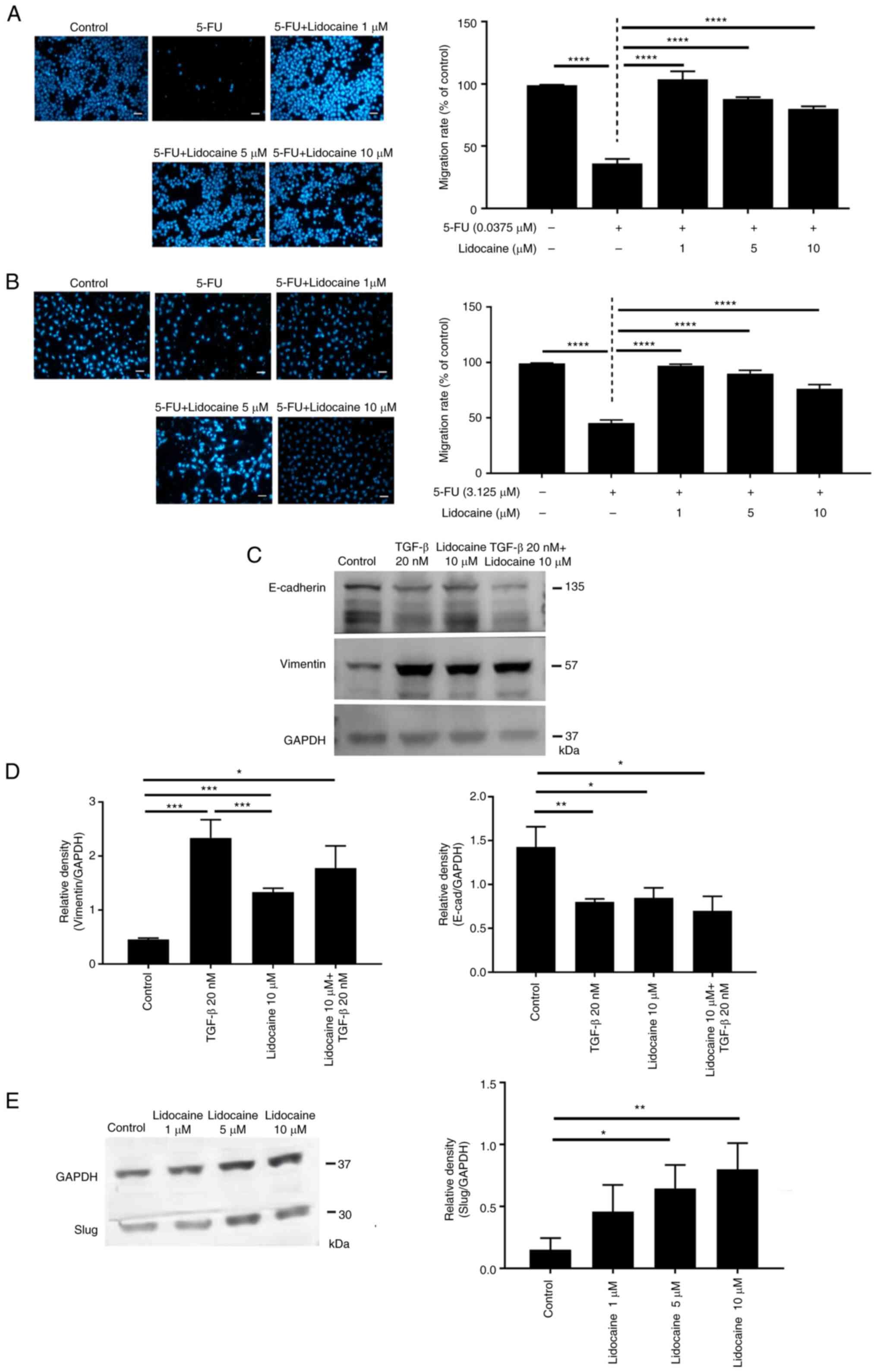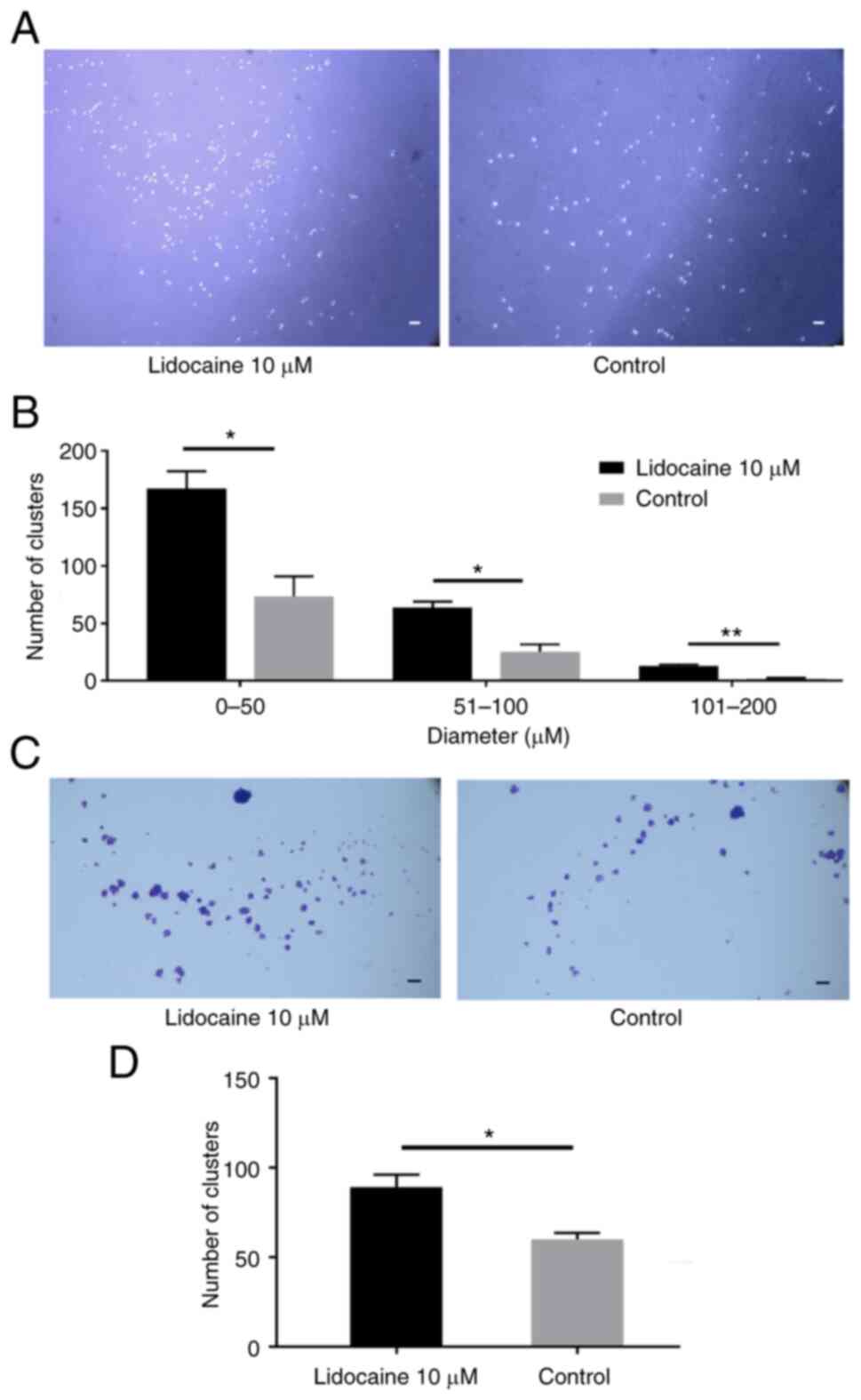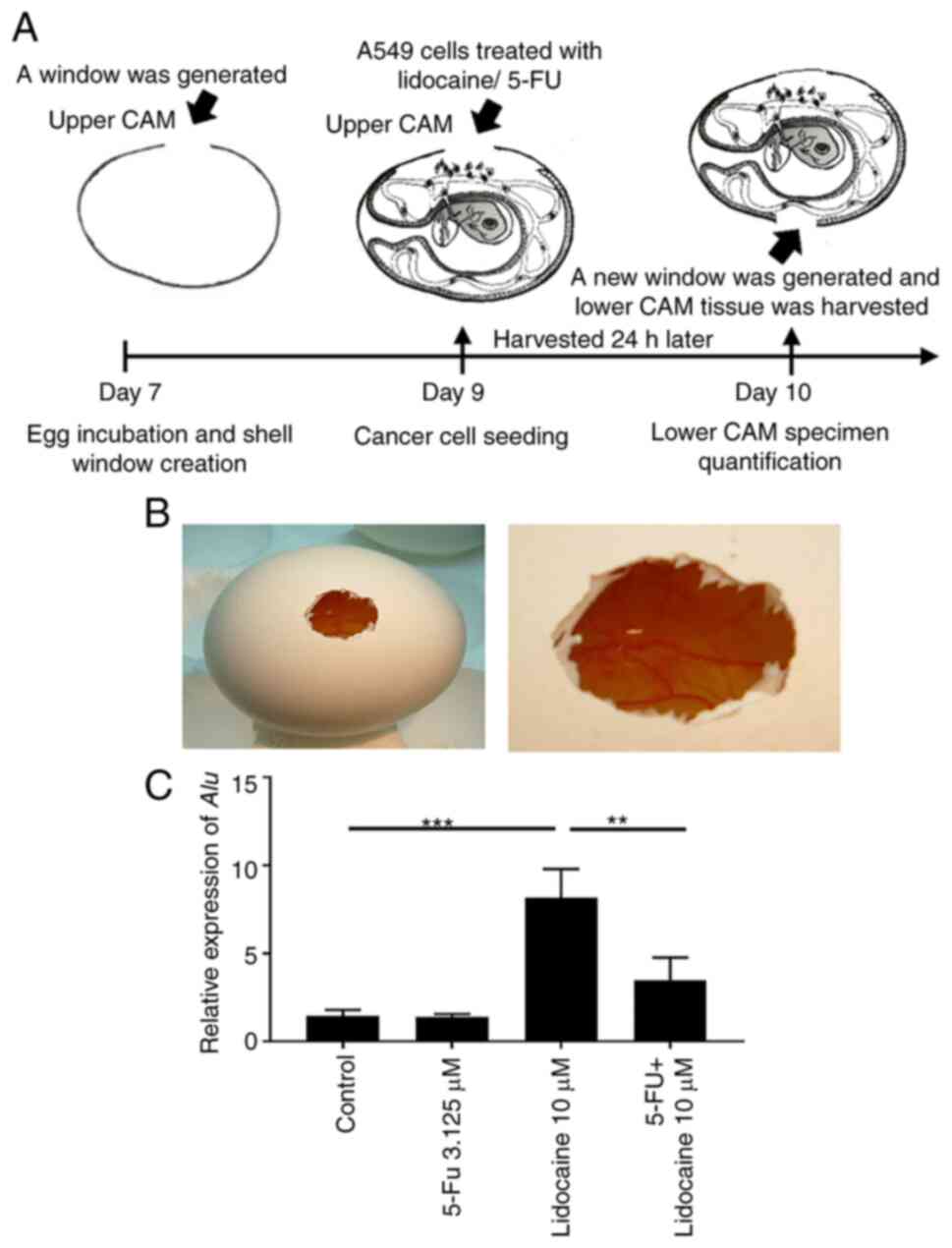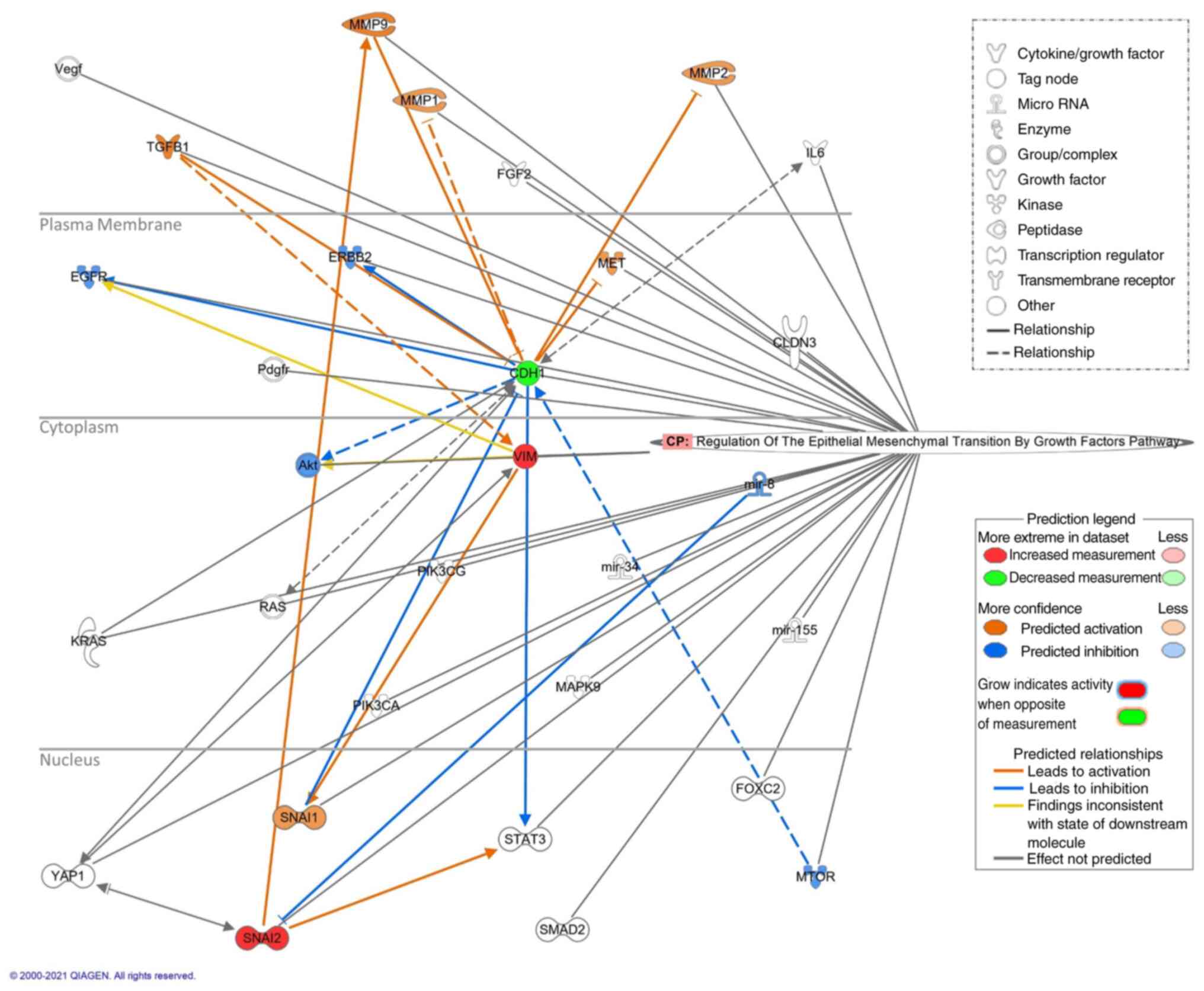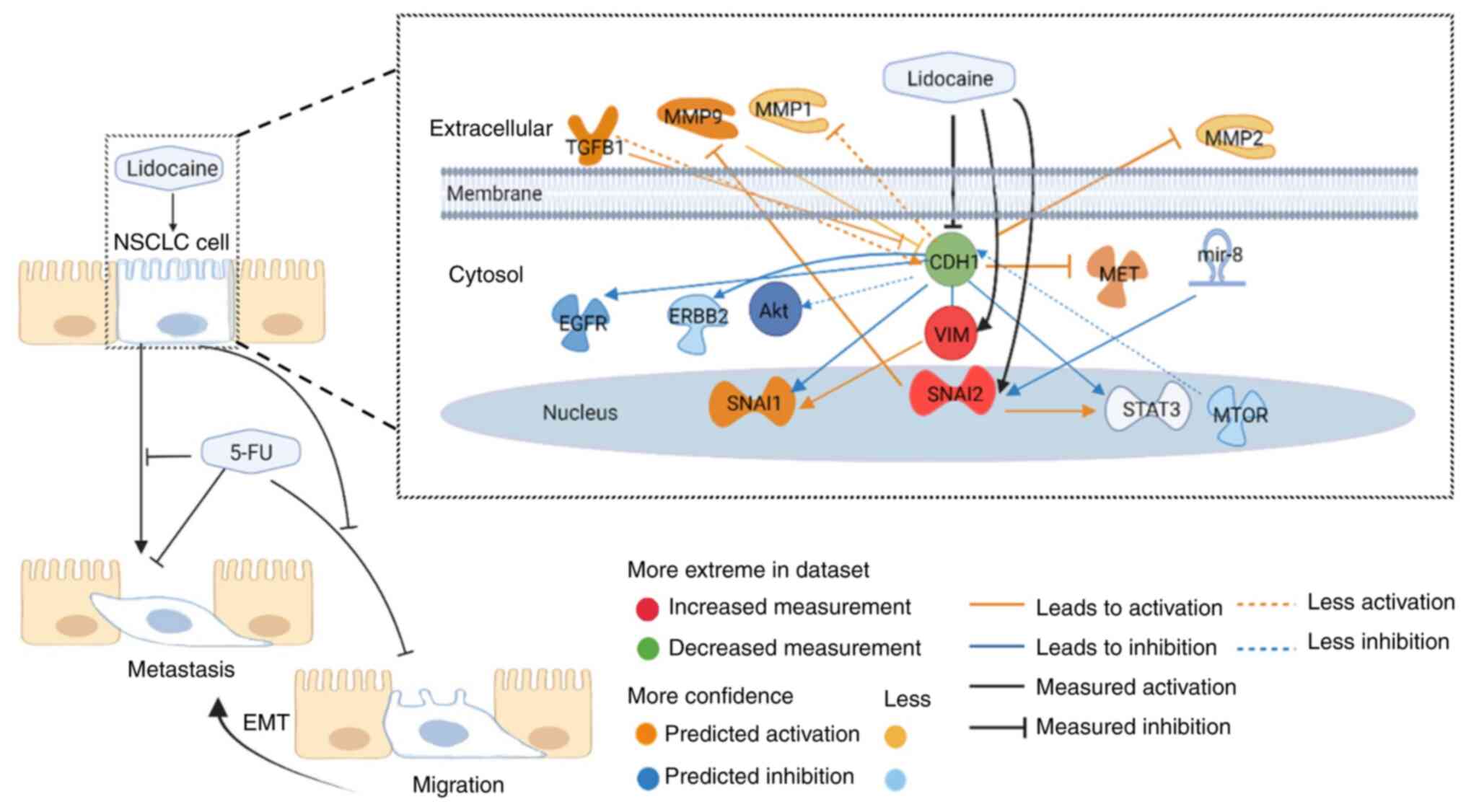|
1
|
Dela Cruz CS, Tanoue LT and Matthay RA:
Lung cancer: Epidemiology, etiology, and prevention. Clin Chest
Med. 32:605–644. 2011. View Article : Google Scholar : PubMed/NCBI
|
|
2
|
Mountain CF: The international system for
staging lung cancer. Semin Surg Oncol. 18:106–115. 2000. View Article : Google Scholar : PubMed/NCBI
|
|
3
|
Chen R, Manochakian R, James L, Azzouqa
AG, Shi H, Zhang Y, Zhao Y, Zhou K and Lou Y: Emerging therapeutic
agents for advanced non-small cell lung cancer. J Hematol Oncol.
13:582020. View Article : Google Scholar : PubMed/NCBI
|
|
4
|
Noro R, Miyanaga A, Minegishi Y, Okano T,
Seike M, Soeno C, Kataoka K, Matsuda K, Yoshimura A and Gemma A:
Histone deacetylase inhibitor enhances sensitivity of
non-small-cell lung cancer cells to 5-FU/S-1 via down-regulation of
thymidylate synthase expression and up-regulation of p21(waf1/cip1)
expression. Cancer Sci. 101:1424–1430. 2010. View Article : Google Scholar : PubMed/NCBI
|
|
5
|
Ettinger DS, Wood DE, Aggarwal C, Aisner
DL, Akerley W, Bauman JR, Bharat A, Bruno DS, Chang JY, Chirieac
LR, et al: NCCN guidelines insights: Non-small cell lung cancer,
version 1.2020. J Natl Compr Canc Netw. 17:1464–1472. 2019.
View Article : Google Scholar : PubMed/NCBI
|
|
6
|
Tan X, Zhang C, Gao W, Sun B, Jiang B and
Song P: Overexpression of microRNA-124-5p sensitizes non-small cell
lung cancer cells to treatment with 5-fluorouracil via AEG-1
regulation. Oncol Lett. 21:52021.PubMed/NCBI
|
|
7
|
Chang A: Chemotherapy, chemoresistance and
the changing treatment landscape for NSCLC. Lung Cancer. 71:3–10.
2011. View Article : Google Scholar : PubMed/NCBI
|
|
8
|
Tedore T: Regional anaesthesia and
analgesia: Relationship to cancer recurrence and survival. Br J
Anaesth. 115 (Suppl 2):ii34–ii45. 2015. View Article : Google Scholar : PubMed/NCBI
|
|
9
|
Xuan W, Hankin J, Zhao H, Yao S and Ma D:
The potential benefits of the use of regional anesthesia in cancer
patients. Int J Cancer. 137:2774–2784. 2015. View Article : Google Scholar : PubMed/NCBI
|
|
10
|
Piegeler T, Schläpfer M, Dull RO, Schwartz
DE, Borgeat A, Minshall RD and Beck-Schimmer B: Clinically relevant
concentrations of lidocaine and ropivacaine inhibit TNFα-induced
invasion of lung adenocarcinoma cells in vitro by blocking the
activation of Akt and focal adhesion kinase. Br J Anaesth.
115:784–791. 2015. View Article : Google Scholar : PubMed/NCBI
|
|
11
|
Piegeler T, Votta-Velis EG, Liu G, Place
AT, Schwartz DE, Beck-Schimmer B, Minshall RD and Borgeat A:
Antimetastatic potential of amide-linked local anesthetics:
Inhibition of lung adenocarcinoma cell migration and inflammatory
Src signaling independent of sodium channel blockade.
Anesthesiology. 117:548–559. 2012. View Article : Google Scholar : PubMed/NCBI
|
|
12
|
Samarin MJ, Mohrien KM and Oliphant CS:
Continuous intravenous antiarrhythmic agents in the intensive care
unit: Strategies for safe and effective use of amiodarone,
lidocaine, and procainamide. Crit Care Nurs Q. 38:329–344. 2015.
View Article : Google Scholar : PubMed/NCBI
|
|
13
|
Kosharskyy B, Almonte W, Shaparin N,
Pappagallo M and Smith H: Intravenous infusions in chronic pain
management. Pain Physician. 16:231–249. 2013. View Article : Google Scholar : PubMed/NCBI
|
|
14
|
Keller D, Seamon J and Jones JS: BET 2:
Usefulness of IV lidocaine in the treatment of renal colic. Emerg
Med J. 33:825–826. 2016. View Article : Google Scholar : PubMed/NCBI
|
|
15
|
Nguyen NL, Kome AM, Lowe DK, Coyne P and
Hawks KG: Intravenous lidocaine as an adjuvant for pain associated
with sickle cell disease. J Pain Palliat Care Pharmacother.
29:359–364. 2015. View Article : Google Scholar : PubMed/NCBI
|
|
16
|
Williams DR and Stark RJ: Intravenous
lignocaine (lidocaine) infusion for the treatment of chronic daily
headache with substantial medication overuse. Cephalalgia.
23:963–971. 2003. View Article : Google Scholar : PubMed/NCBI
|
|
17
|
Dunn LK and Durieux ME: Perioperative use
of intravenous lidocaine. Anesthesiology. 126:729–737. 2017.
View Article : Google Scholar : PubMed/NCBI
|
|
18
|
Sun H and Sun Y: Lidocaine inhibits
proliferation and metastasis of lung cancer cell via regulation of
miR-539/EGFR axis. Artif Cells Nanomed Biotechnol. 47:2866–2874.
2019. View Article : Google Scholar : PubMed/NCBI
|
|
19
|
Wang HW, Wang LY, Jiang L, Tian SM, Zhong
TD and Fang XM: Amide-linked local anesthetics induce apoptosis in
human non-small cell lung cancer. J Thorac Dis. 8:2748–2757. 2016.
View Article : Google Scholar : PubMed/NCBI
|
|
20
|
Zhou Y, Du Q, Zhao Q, Zhang M, Qin X,
Jiang Y and Luan Y: A heme-regulatable chemodynamic nanodrug
harnessing transcription factor Bach1 against lung cancer
metastasis. J Colloid Interface Sci. 610:698–708. 2022. View Article : Google Scholar : PubMed/NCBI
|
|
21
|
Ning J, Cui X, Li N, Li N, Zhao B, Miao J
and Lin Z: Activation of GRP78 ATPase suppresses A549 lung cancer
cell migration by promoting ITGB4 degradation. Cell Adh Migr.
16:107–114. 2022. View Article : Google Scholar : PubMed/NCBI
|
|
22
|
Ediriweera MK, Tennekoon KH, Samarakoon
SR, Thabrew I and De Silva ED: Induction of apoptosis in MCF-7
breast cancer cells by sri lankan endemic mango (Mangifera
zeylanica) fruit peel through oxidative stress and analysis of
its phytochemical constituents. J Food Biochem. 41:e122942017.
View Article : Google Scholar
|
|
23
|
Orellana EA and Kasinski AL:
Sulforhodamine B (SRB) assay in cell culture to investigate cell
proliferation. Bio Protoc. 6:e19842016. View Article : Google Scholar : PubMed/NCBI
|
|
24
|
Feoktistova M, Geserick P and Leverkus M:
Crystal violet assay for determining viability of cultured cells.
Cold Spring Harb Protoc. 2016.pdb.prot087379, 2016. View Article : Google Scholar
|
|
25
|
Miyashita N, Enokido T, Horie M, Fukuda K,
Urushiyama H, Strell C, Brunnström H, Micke P, Saito A and Nagase
T: TGF-β-mediated epithelial-mesenchymal transition and
tumor-promoting effects in CMT64 cells are reflected in the
transcriptomic signature of human lung adenocarcinoma. Sci Rep.
11:223802021. View Article : Google Scholar : PubMed/NCBI
|
|
26
|
Ho BY, Wu YM, Hsu YW, Hsu LC, Kuo YH,
Chang KJ and Pan TM: Effects of Monascus-fermented rice extract on
malignant cell-associated neovascularization and intravasation
determined using the chicken embryo chorioallantoic membrane model.
Integr Cancer Ther. 9:204–212. 2010. View Article : Google Scholar : PubMed/NCBI
|
|
27
|
Livak KJ and Schmittgen TD: Analysis of
relative gene expression data using real-time quantitative PCR and
the 2(−Delta Delta C(T)) method. Methods. 25:402–408. 2001.
View Article : Google Scholar : PubMed/NCBI
|
|
28
|
Kim J, Yu W, Kovalski K and Ossowski L:
Requirement for specific proteases in cancer cell intravasation as
revealed by a novel semiquantitative PCR-based assay. Cell.
94:353–362. 1998. View Article : Google Scholar : PubMed/NCBI
|
|
29
|
Kariya Y, Kato K, Hayashizaki Y, Himeno S,
Tarui S and Matsubara K: Revision of consensus sequence of human
Alu repeats-a review. Gene. 53:1–10. 1987. View Article : Google Scholar : PubMed/NCBI
|
|
30
|
Unahabhokha T, Chanvorachote P, Sritularak
B, Kitsongsermthon J and Pongrakhananon V: Gigantol inhibits
epithelial to mesenchymal process in human lung cancer cells. Evid
Based Complement Alternat Med. 2016:45616742016. View Article : Google Scholar : PubMed/NCBI
|
|
31
|
Usman S, Waseem NH, Nguyen TKN, Mohsin S,
Jamal A, Teh MT and Waseem A: Vimentin is at the heart of
epithelial mesenchymal transition (EMT) mediated metastasis.
Cancers (Basel). 13:49852021. View Article : Google Scholar : PubMed/NCBI
|
|
32
|
Mahmood MQ, Shukla SD, Ward C and Walters
EH: The underappreciated role of epithelial mesenchymal transition
in chronic obstructive pulmonary disease and its strong link to
lung cancer. Biomolecules. 11:13942021. View Article : Google Scholar : PubMed/NCBI
|
|
33
|
Zhu X, Chen L, Liu L and Niu X:
EMT-mediated acquired EGFR-TKI resistance in NSCLC: Mechanisms and
strategies. Front Oncol. 9:10442019. View Article : Google Scholar : PubMed/NCBI
|
|
34
|
Ancel J, Dewolf M, Deslée G, Nawrocky-Raby
B, Dalstein V, Gilles C and Polette M: Clinical impact of the
epithelial-mesenchymal transition in lung cancer as a biomarker
assisting in therapeutic decisions. Cells Tissues Organs.
211:91–109. 2022. View Article : Google Scholar : PubMed/NCBI
|
|
35
|
Nieto MA, Huang RY, Jackson RA and Thiery
JP: Emt: 2016. Cell. 166:21–45. 2016. View Article : Google Scholar : PubMed/NCBI
|
|
36
|
Herroeder S, Pecher S, Schönherr ME,
Kaulitz G, Hahnenkamp K, Friess H, Böttiger BW, Bauer H, Dijkgraaf
MG, Durieux ME and Hollmann MW: Systemic lidocaine shortens length
of hospital stay after colorectal surgery: A double-blinded,
randomized, placebo-controlled trial. Ann Surg. 246:192–200. 2007.
View Article : Google Scholar : PubMed/NCBI
|
|
37
|
Kaba A, Laurent SR, Detroz BJ, Sessler DI,
Durieux ME, Lamy ML and Joris JL: Intravenous lidocaine infusion
facilitates acute rehabilitation after laparoscopic colectomy.
Anesthesiology. 106:11–18. 5–6. 2007. View Article : Google Scholar : PubMed/NCBI
|
|
38
|
Mammoto T, Higashiyama S, Mukai M, Mammoto
A, Ayaki M, Mashimo T, Hayashi Y, Kishi Y, Nakamura H and Akedo H:
Infiltration anesthetic lidocaine inhibits cancer cell invasion by
modulating ectodomain shedding of heparin-binding epidermal growth
factor-like growth factor (HB-EGF). J Cell Physiol. 192:351–358.
2002. View Article : Google Scholar : PubMed/NCBI
|
|
39
|
Mao L, Lin S and Lin J: The effects of
anesthetics on tumor progression. Int J Physiol Pathophysiol
Pharmacol. 5:1–10. 2013.PubMed/NCBI
|
|
40
|
Koltai T: Voltage-gated sodium channel as
a target for metastatic risk reduction with re-purposed drugs.
F1000Res. 4:2972015. View Article : Google Scholar : PubMed/NCBI
|
|
41
|
Elajnaf T, Baptista-Hon DT and Hales TG:
Potent inactivation-dependent inhibition of adult and neonatal
NaV1.5 channels by lidocaine and levobupivacaine. Anesth Analg.
127:650–660. 2018. View Article : Google Scholar : PubMed/NCBI
|
|
42
|
Zhang L, Hu R, Cheng Y, Wu X, Xi S, Sun Y
and Jiang H: Lidocaine inhibits the proliferation of lung cancer by
regulating the expression of GOLT1A. Cell Prolif. 50:e123642017.
View Article : Google Scholar : PubMed/NCBI
|
|
43
|
Lin JA, Chen JH, Lee YW, Lin CS, Hsieh MH,
Chang CC, Wong CS, Chen JJ, Yeh GC, Lin FY and Chen TL: Biphasic
effect of curcumin on morphine tolerance: A preliminary evidence
from cytokine/chemokine protein array analysis. Evid Based
Complement Alternat Med. 2011:4521532011. View Article : Google Scholar : PubMed/NCBI
|
|
44
|
Chan SM, Lin BF, Wong CS, Chuang WT, Chou
YT and Wu ZF: Levobuipivacaine-induced dissemination of A549 lung
cancer cells. Sci Rep. 7:86462017. View Article : Google Scholar : PubMed/NCBI
|
|
45
|
Lokman NA, Elder ASF, Ricciardelli C and
Oehler MK: Chick chorioallantoic membrane (CAM) assay as an in vivo
model to study the effect of newly identified molecules on ovarian
cancer invasion and metastasis. Int J Mol Sci. 13:9959–9970. 2012.
View Article : Google Scholar : PubMed/NCBI
|
|
46
|
Merlos Rodrigo MA, Casar B, Michalkova H,
Jimenez Jimenez AM, Heger Z and Adam V: Extending the applicability
of in ovo and ex ovo chicken chorioallantoic membrane assays to
study cytostatic activity in neuroblastoma cells. Front Oncol.
11:7073662021. View Article : Google Scholar : PubMed/NCBI
|
|
47
|
Agrawal S, Chaugule S, More S, Rane G and
Indap M: Methanolic extract of Euchelus asper exhibits in-ovo
anti-angiogenic and in vitro anti-proliferative activities. Biol
Res. 50:412017. View Article : Google Scholar : PubMed/NCBI
|
|
48
|
Ribatti D: The chick embryo
chorioallantoic membrane (CAM). A multifaceted experimental model.
Mech Dev. 141:70–77. 2016. View Article : Google Scholar : PubMed/NCBI
|
|
49
|
Valastyan S and Weinberg RA: Tumor
metastasis: Molecular insights and evolving paradigms. Cell.
147:275–292. 2011. View Article : Google Scholar : PubMed/NCBI
|
|
50
|
Pezzella F and Gatter KC: Evidence showing
that tumors can grow without angiogenesis and can switch between
angiogenic and nonangiogenic phenotypes. J Natl Cancer Inst.
108:djw0322016. View Article : Google Scholar : PubMed/NCBI
|















